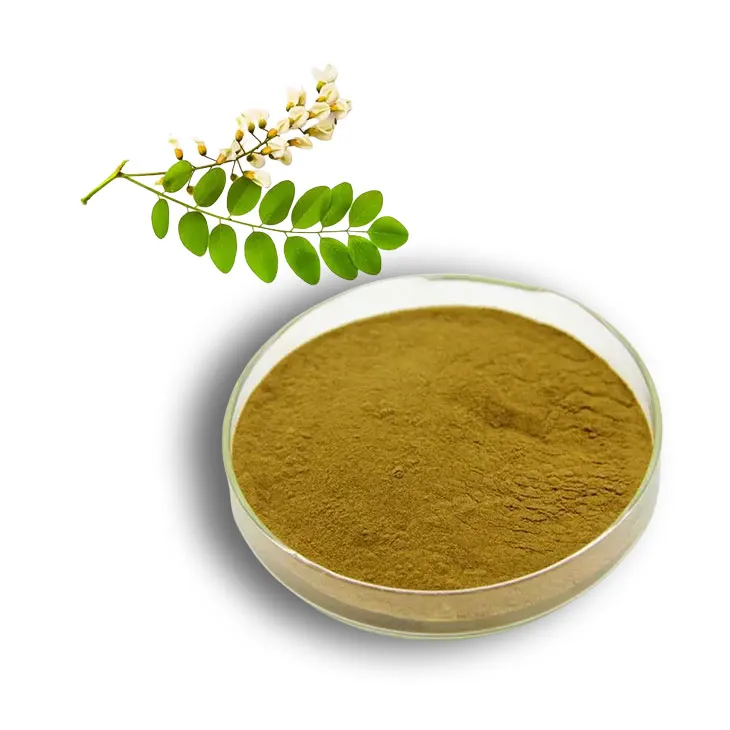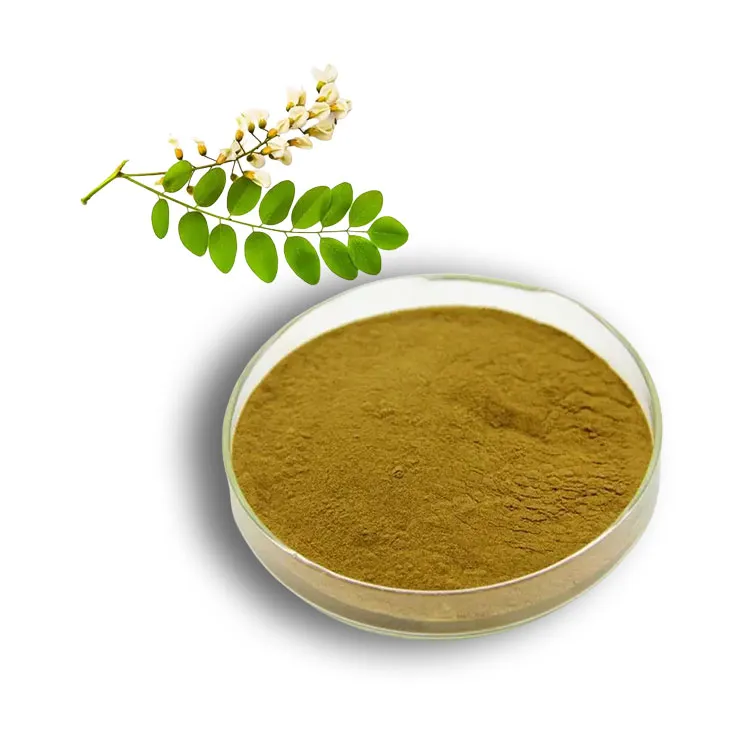- 0086-571-85302990
- sales@greenskybio.com
What is Sophora japonica flower extract? Definition, types, history and nutritional value.
2024-12-10

1. Definition of Sophora Japonica Flower Extract
Sophora Japonica Flower Extract is the extractive matter obtained from the flowers of Sophora japonica. Sophora japonica is a common plant, and its flowers are rich in various bioactive compounds. Through different extraction methods, such as solvent extraction, supercritical fluid extraction, etc., the valuable substances in the flowers can be separated and concentrated to form the extract. This extract contains a variety of chemical components, which may include phenolic compounds, flavonoids, alkaloids, and other substances.

2. Types of Sophora Japonica Flower Extract
2.1 Phenolic extracts
Phenolic extracts are one of the important types of Sophora japonica flower extract. Phenolic compounds in Sophora japonica flowers possess antioxidant, anti - inflammatory and other biological activities. These phenolic extracts are often targeted for their antioxidant properties, which can help in scavenging free radicals in the body. For example, phenolic acids and phenolic glycosides are common phenolic components in the extract. They can play a role in protecting cells from oxidative damage, which is closely related to many diseases such as cancer, cardiovascular diseases, and neurodegenerative diseases.
2.2 Flavonoid - rich extracts
Flavonoids are another major group of components in Sophora japonica flower extract. Flavonoid - rich extracts have multiple beneficial effects on human health. Flavonoids can enhance the antioxidant capacity of the body, help in reducing inflammation, and may also have a certain impact on the regulation of the immune system. Different flavonoids in the extract, such as rutin, Quercetin, etc., may have different biological activities. For instance, rutin has been shown to have vasoprotective effects, which can help in preventing damage to blood vessels and reducing the risk of cardiovascular diseases.
2.3 Alkaloid - containing extracts
Although alkaloids are present in relatively small amounts in Sophora japonica flower extract, they also play an important role. Alkaloids may have certain pharmacological activities, such as antibacterial, antiviral, and analgesic effects. However, due to the potential toxicity of some alkaloids, special attention needs to be paid during the extraction and application processes to ensure safety.

3. History of Sophora japonica utilization
Sophora japonica has a long - standing history of utilization in various cultures. In traditional Chinese medicine, Sophora japonica has been used for centuries. The flowers of Sophora japonica were often used for their medicinal properties, such as clearing heat, cooling blood, and stopping bleeding. In ancient medical texts, there are records of using Sophora japonica flowers to treat various diseases, such as hemorrhoids, blood in the stool, and some febrile diseases.
As time progressed, the understanding of Sophora japonica became more in - depth. People gradually discovered more uses for its different parts, including the flowers. In addition to traditional medicine, Sophora japonica also began to be used in some folk remedies and health - care practices. For example, in some regions, Sophora japonica flower tea was made for drinking, which was believed to have certain health - promoting effects, such as relieving heat and improving digestion.
In modern times, with the development of scientific research technology, the study of Sophora japonica has entered a new stage. The extraction of valuable components from Sophora japonica flowers has become more refined and scientific. Scientists are constantly exploring the chemical composition and biological activity of Sophora japonica flower extract, aiming to develop new drugs, health products, and cosmetics based on it.

4. Nutritional value of Sophora japonica flower extract
4.1 Antioxidant effects
One of the most important nutritional values of Sophora japonica flower extract is its antioxidant effect. Antioxidants in the extract can help in neutralizing free radicals in the body. Free radicals are highly reactive molecules that can cause damage to cells, proteins, and DNA. By scavenging free radicals, Sophora japonica flower extract can play a role in preventing many chronic diseases, such as cancer, cardiovascular diseases, and aging - related diseases. The phenolic compounds and flavonoids in the extract are the main contributors to its antioxidant activity.
4.2 Anti - inflammatory properties
The extract also shows anti - inflammatory properties. Inflammation is a normal physiological response of the body, but chronic inflammation can lead to many diseases. Sophora japonica flower extract can regulate the body's inflammatory response through various mechanisms. For example, some components in the extract can inhibit the production of inflammatory cytokines, thereby reducing inflammation. This anti - inflammatory effect makes it potentially useful in the treatment or prevention of inflammatory diseases such as arthritis, colitis, and skin inflammation.
4.3 Cardiovascular protection
There are several aspects of cardiovascular protection provided by Sophora japonica flower extract. Firstly, as mentioned above, the antioxidant effect can prevent the oxidation of low - density lipoprotein (LDL), which is a major risk factor for atherosclerosis. Secondly, some components in the extract, such as rutin, can help in strengthening blood vessels, improving vascular endothelial function, and reducing blood pressure. These effects work together to reduce the risk of cardiovascular diseases, such as heart attacks and strokes.
4.4 Anti - aging effects
The anti - aging effects of Sophora japonica flower extract are also related to its antioxidant and anti - inflammatory properties. By protecting cells from oxidative damage and reducing chronic inflammation, the extract can slow down the aging process at the cellular level. In addition, some components in the extract may also have an impact on the regulation of gene expression related to aging, further contributing to anti - aging effects.
4.5 Other potential benefits
In addition to the above - mentioned benefits, Sophora japonica flower extract may also have other potential benefits. For example, some studies have suggested that it may have a certain impact on the regulation of the immune system, enhancing the body's immunity. It may also have antibacterial and antiviral properties, which can help in preventing and treating some infectious diseases. However, more research is needed to fully confirm these potential benefits.
5. Conclusion
In conclusion, Sophora japonica flower extract is a valuable natural product with diverse types, a long - standing history of utilization, and rich nutritional value. It has great potential in the fields of medicine, health products, and cosmetics. However, further research is still needed to fully understand its chemical composition, biological activity, and safety, in order to promote its more rational and effective application.
FAQ:
1. How is Sophora japonica flower extract made?
The extraction of Sophora japonica flower extract typically involves processes such as solvent extraction. Different solvents can be used to dissolve and separate the desired components from the Sophora japonica flowers. This may include using organic solvents like ethanol or water - based extraction methods, followed by purification steps to obtain the final extract.
2. Are there any side effects of using Sophora japonica flower extract?
While Sophora japonica flower extract has potential health benefits, improper use or excessive consumption may lead to some side effects. For example, it may cause allergic reactions in some sensitive individuals. Also, if not properly processed, there could be contaminants in the extract that might pose risks. However, when used within appropriate dosages and in a well - regulated manner, the risks are relatively low.
3. What are the main phenolic compounds in Sophora japonica flower extract?
Some of the main phenolic compounds in Sophora japonica flower extract include flavonoids. These flavonoids contribute to the antioxidant properties of the extract. Examples of such flavonoids are rutin and Quercetin, which are known for their ability to scavenge free radicals and play a role in various physiological functions in the body.
4. How can Sophora japonica flower extract be used in the cosmetic industry?
In the cosmetic industry, Sophora japonica flower extract can be used in various ways. Due to its antioxidant properties, it can be added to skincare products like creams and serums to help protect the skin from environmental damage, such as damage caused by UV radiation and pollution. It may also have anti - aging effects, helping to reduce the appearance of wrinkles and improve skin elasticity, so it can be an ingredient in anti - aging cosmetics.
5. Can Sophora japonica flower extract be used in food?
Yes, in some cases, Sophora japonica flower extract can be used in food. However, its use in food is regulated. It may be used as a natural additive for its potential health - promoting properties, such as its antioxidant effects. But strict safety and quality control measures need to be followed to ensure that it is safe for consumption and does not cause any adverse effects.
Related literature
- The Chemical Composition and Bioactivities of Sophora japonica: A Review"
- "Sophora japonica Flower Extract: Potential Applications in Health and Cosmetics"
- "Nutritional and Medicinal Values of Sophora japonica"
- ▶ Hesperidin
- ▶ citrus bioflavonoids
- ▶ plant extract
- ▶ lycopene
- ▶ Diosmin
- ▶ Grape seed extract
- ▶ Sea buckthorn Juice Powder
- ▶ Beetroot powder
- ▶ Hops Extract
- ▶ Artichoke Extract
- ▶ Reishi mushroom extract
- ▶ Astaxanthin
- ▶ Green Tea Extract
- ▶ Curcumin Extract
- ▶ Horse Chestnut Extract
- ▶ Other Problems
- ▶ Boswellia Serrata Extract
- ▶ Resveratrol Extract
- ▶ Marigold Extract
- ▶ Grape Leaf Extract
- ▶ blog3
- ▶ blog4
- ▶ blog5
-
Pure 85% Tomentil Extract.
2024-12-10
-
White mustard seed extract
2024-12-10
-
Milk Thistle Extract
2024-12-10
-
Lotus leaf extract
2024-12-10
-
Withania Somnifera Extract
2024-12-10
-
Cassia Seed Extract
2024-12-10
-
Plantain extract
2024-12-10
-
Coix Seed Extract
2024-12-10
-
Hawthorn Extract
2024-12-10
-
Phellodendron Extract
2024-12-10
-
Cat Claw Extract
2024-12-10





















